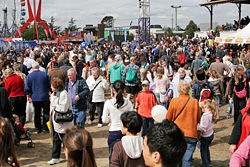Society
2008/9 Schools Wikipedia Selection. Related subjects: Community organisations; Culture and Diversity; Politics and government

A society is a grouping of individuals which is characterized by common interests and may have distinctive culture and institutions. Members of a society may be from different ethnic groups. A society may be a particular people, such as Saxons, a nation state, such as Great Britain, or a broader cultural group, such as a Western society.
The word society may also refer to an organized voluntary association of people for religious, benevolent, cultural, scientific, political, patriotic, or other purposes.
Origin and usage
The English word "society" emerged in the 15th century and is derived from the French société. The French word, in turn, had its origin in the Latin societas, a "friendly association with others," from socius meaning "companion, associate, comrade or business partner." The Latin word was derived from the Greek socus locus, meaning locally social, and implied a social contract between members of the community. There is no analogue in Russian, a throwback to Soviet rule. The Russian equivalent of society is "общество" or "obshchestvo", which means 'commonality'. Implicit in the meaning of society is that its members share some mutual concern or interest, a common objective or common characteristics
In political science, the term is often used to mean the totality of human relationships, generally in contrast to the State, i.e., the apparatus of rule or government within a territory:
- I mean by it [the State] that summation of privileges and dominating positions which are brought into being by extra-economic power... I mean by Society, the totality of concepts of all purely natural relations and institutions between man and man...|
In the social sciences such as sociology, society has been usedto mean a group of people that form a semi-closed social system, in which most interactions are with other individuals belonging to the group. Society is sometimes contrasted with culture. For example, Clifford Geertz has suggested that society is the actual arrangement of social relations while culture is made up of beliefs and symbolic forms.
According to sociologist Richard Jenkins, the term addresses a number of important existential issues facing people:
- How humans think and exchange information – the sensory world makes up only a fraction of human experience. In order to understand the world, we have to conceive of human interaction in the abstract (i.e., society).
- Many phenomena cannot be reduced to individual behaviour – to explain certain conditions, a view of something "greater than the sum of its parts" is needed.
- Collectives often endure beyond the lifespan of individual members.
- The human condition has always meant going beyond the evidence of our senses; every aspect of our lives is tied to the collective.
Evolution of societies
According to anthropologist Maurice Godelier, one critical novelty in human society, in contrast to humanity's closest biological relatives (chimpanzees and bonobos), is the parental role assumed by the males, which were unaware of their "father" connection.
Gerhard Lenski, a sociologist, differentiates societies based on their level of technology, communication and economy: (1) hunters and gatherers, (2) simple agricultural, (3) advanced agricultural, (4) industrial. and now (6) virtual. This is somewhat similar to the system earlier developed by anthropologists Morton H. Fried, a conflict theorist, and Elman Service, an integration theorist, who have produced a system of classification for societies in all human cultures based on the evolution of social inequality and the role of the state. This system of classification contains four categories:
- Hunter-gatherer bands, which are generally egalitarian.
- Tribal societies in which there are some limited instances of social rank and prestige.
- Stratified structures led by chieftains.
- Civilizations, with complex social hierarchies and organized, institutional governments.
In addition to this there are:
- Humanity, mankind, that upon which rest all the elements of society, including society's beliefs.
- virtual-society is a society based on online identity.
Over time, some cultures have progressed toward more-complex forms of organization and control. This cultural evolution has a profound effect on patterns of community. Hunter-gatherer tribes settled around seasonal foodstocks to become agrarian villages. Villages grew to become towns and cities. Cities turned into city-states and nation-states.
Today, anthropologists and many social scientists vigorously oppose the notion of cultural evolution and rigid "stages" such as these. In fact, much anthropological data has suggested that complexity (civilization, population growth and density, specialization, etc.) does not always take the form of hierarchical social organization or stratification.
Also, cultural relativism as a widespread approach/ethic has largely replaced notions of "primitive," better/worse, or "progress" in relation to cultures (including their material culture/technology and social organization).
Characteristics of society
The following three components are common to all definitions of society:
- Social networks
- Criteria for membership, and
- Characteristic patterns of organization
Each of these will be explored further in the following sections.
Social networks
Social networks are maps of the relationships between people. Structural features such as proximity, frequency of contact and type of relationship (e.g., relative, friend, colleague) define various social networks.
Organization of society
Human societies are often organized according to their primary means of subsistence. As noted in the section on " Evolution of societies", above, social scientists identify hunter-gatherer societies, nomadic pastoral societies, horticulturalist or simple farming societies, and intensive agricultural societies, also called civilizations. Some consider industrial and post-industrial societies to be qualitatively different from traditional agricultural societies.
One common theme for societies in general is that they serve to aid individuals in a time of crisis. Traditionally, when an individual requires aid, for example at birth, death, sickness, or disaster, members of that society will rally others to render aid, in some form—symbolic, linguistic, physical, mental, emotional, financial, medical, or religious. Many societies will distribute largess, at the behest of some individual or some larger group of people. This type of generosity can be seen in all known cultures; typically, prestige accrues to the generous individual or group. Conversely, members of a society may also shun or scapegoat members of the society who violate its norms. Mechanisms such as gift-giving and scapegoating, which may be seen in various types of human groupings, tend to be institutionalized within a society. Social evolution as a phenomenon carries with itself certain elements that could be detrimental to the population it serves.
Some societies will bestow status on an individual or group of people, when that individual or group performs an admired or desired action. This type of recognition is bestowed by members of that society on the individual or group in the form of a name, title, manner of dress, or monetary reward. Males, in many societies, are particularly susceptible to this type of action and subsequent reward, even at the risk of their lives. Action by an individual or larger group in behalf of some cultural ideal is seen in all societies. The phenomena of community action, shunning, scapegoating, generosity, and shared risk and reward occur in subsistence-based societies and in more technology-based civilizations.
Societies may also be organized according to their political structure. In order of increasing size and complexity, there are bands, tribes, chiefdoms, and state societies. These structures may have varying degrees of political power, depending on the cultural geographical, and historical environments that these societies must contend with. Thus, a more isolated society with the same level of technology and culture as other societies is more likely to survive than one in closer proximity to others that may encroach on their resources (see history for examples}. A society that is unable to offer an effective response to other societies it competes with will usually be subsumed into the culture of the competing society (see technology for examples).
Shared belief or common goal
People of many nations united by common political and cultural traditions, beliefs, or values are sometimes also said to be a society (such as Judeo-Christian, Eastern, and Western). When used in this context, the term is employed as a means of contrasting two or more "societies" whose members represent alternative conflicting and competing worldviews (see Secret Societies).
Some academic, learned and scholarly associations describe themselves as societies (for example, the American Mathematical Society). More commonly, professional organizations often refer to themselves as societies (e.g., the American Society of Civil Engineers, American Chemical Society). In the United Kingdom and the United States, learned societies are normally nonprofit and have charitable status. In science, they range in size to include national scientific societies (i.e., the Royal Society) to regional natural history societies. Academic societies may have interest in a wide range of subjects, including the arts, humanities and science.
In some countries (for example the United States and France), the term "society" is used in commerce to denote a partnership between investors or the start of a business. In the United Kingdom, partnerships are not called societies, but cooperatives or mutuals are often known as societies (such as friendly societies and building societies). In Latin America, the term society may be used in commerce denoting a partnership between investors, or anonymous investors; for example: "Proveedor Industrial Anahuac S.A." where S.A. stands for Anonymous Society (Sociedad Anónima); however in Mexico in other type of partnership it would be declared as S.A. de C.V. or S.A. de R.L., indicating the level of commitment of capital and the responsibilities from each member towards their own association and towards the society in general and supervised by the corresponding jurisdictional civil and judicial authorities.
Ontology
As a related note, there is still an ongoing debate in sociological and anthropological circles as to whether there exists an entity we could call society. Some Marxist theorists, like Louis Althusser, Ernesto Laclau and Slavoj Zizek, have argued that society is nothing more than an effect of the ruling ideology of a certain class system, and shouldn't be used as a sociological notion. Marx's concept of society as the sum total of social relations among members of a community contrasts with interpretations from the perspective of methodological individualism where society is simply the sum total of individuals in a territory.
In 1987 Margaret Thatcher famously said "There is no such thing as society".

